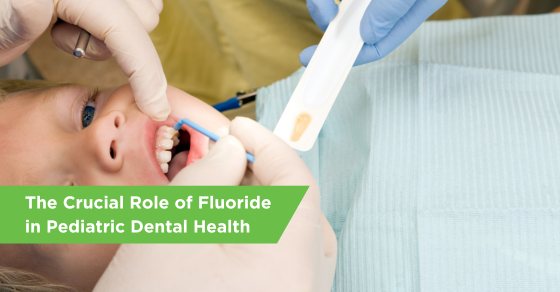Unveiling the Magic: The Crucial Role of Fluoride in Pediatric Dental Health
- January 15th, 2024
- Childrens Dental Tips
- Andrew Adams

Pediatric dental health is a critical aspect of a child’s overall well-being, laying the foundation for a lifetime of healthy smiles. One key player in the realm of dental care is fluoride, a mineral that often takes the spotlight for its remarkable impact on oral health. In this blog post, we’ll delve into the essential role of fluoride in pediatric dental health, exploring its benefits, sources, and the ongoing debate surrounding its use.
Pediatric dental health is a critical aspect of a child’s overall well-being, laying the foundation for a lifetime of healthy smiles. One key player in the realm of dental care is fluoride, a mineral that often takes the spotlight for its remarkable impact on oral health. In this blog post, we’ll delve into the essential role of fluoride in pediatric dental health, exploring its benefits, sources, and the ongoing debate surrounding its use.
Understanding Fluoride
Fluoride, a natural mineral found in water, soil, and certain foods, has gained recognition for its ability to strengthen teeth and prevent tooth decay. It achieves this through a process called remineralization, where it helps to rebuild weakened tooth enamel. This makes fluoride a valuable ally in the fight against cavities, especially in the pediatric population where dental health habits are still developing.
Fluoride’s Role in Tooth Development
The formative years of a child’s life are crucial for dental development, and fluoride plays a pivotal role during this period. As teeth emerge and mature, fluoride integrates into the enamel structure, making it more resistant to acid attacks from bacteria and sugars. This fortification process is particularly beneficial for young teeth that are still growing and more susceptible to decay.
Benefits of Fluoride in Pediatric Dental Health
1. Preventing Tooth Decay: The primary benefit of fluoride is its ability to prevent tooth decay by strengthening the enamel. Regular exposure to fluoride helps create a protective barrier, reducing the risk of cavities.
2. Reversing Early Signs of Decay: In cases where early signs of decay are present, fluoride can work to reverse the damage through remineralization. This is especially significant in pediatric dentistry, as it allows for conservative treatment approaches.
3. Supporting Proper Tooth Development: Fluoride contributes to the proper development of teeth, ensuring they are strong and resilient. This is particularly crucial during the formative years when good dental habits are being established.
Sources of Fluoride
While fluoride is naturally present in water and some foods, additional sources are often recommended to ensure optimal dental health, especially for children. These sources include:
1. Fluoridated Water: Many communities add fluoride to their water supply to provide a systemic approach to dental health. Consuming fluoridated water helps in the development of strong and resistant tooth enamel.
2. Toothpaste and Mouthwash: Fluoride is a common ingredient in toothpaste and mouthwash. Children’s toothpaste often contains a lower concentration of fluoride to cater to their specific needs and reduce the risk of fluorosis, a cosmetic issue caused by excessive fluoride intake during tooth development.
3. Dental Treatments: Professional fluoride treatments, commonly applied during dental check-ups, offer a concentrated dose of fluoride to provide an extra layer of protection against cavities.
The Fluoride Debate: Finding the Balance
While the benefits of fluoride in pediatric dental health are widely acknowledged, a longstanding debate surrounds the optimal levels of fluoride exposure. Some concerns have been raised about the risk of fluorosis, especially when young children ingest excessive amounts of fluoride during tooth development.
Fluorosis is a cosmetic issue characterized by changes in tooth enamel color and texture. Mild fluorosis may present as white spots, while severe cases can result in brown staining. It’s essential for parents and caregivers to strike a balance, ensuring children receive enough fluoride for dental health without exceeding recommended levels.
Tips for Safe Fluoride Use in Pediatric Dentistry
1. Supervised Toothbrushing: Until a child is old enough to reliably spit out toothpaste, parents should supervise toothbrushing to prevent excessive fluoride ingestion. A small, pea-sized amount of toothpaste is sufficient for young children.
2. Fluoride Supplements: In areas where water is not fluoridated, pediatricians or dentists may recommend fluoride supplements. It’s crucial to follow prescribed dosages to avoid overexposure.
3. Regular Dental Check-ups: Regular dental check-ups provide an opportunity for professionals to assess a child’s fluoride needs. Dentists may recommend additional fluoride treatments or adjustments based on an individual’s oral health.
In the realm of pediatric dentistry, fluoride emerges as a superhero, safeguarding the smiles of the youngest members of our communities. Its ability to prevent tooth decay, support proper dental development, and reverse early signs of damage makes it an indispensable tool in the fight against cavities. While the fluoride debate continues, responsible use and supervision can ensure that children reap the maximum benefits without compromising their dental health.
As we navigate the complex landscape of pediatric dental care, let’s celebrate the magic of fluoride—a mineral that contributes not just to stronger teeth but to brighter, healthier smiles that last a lifetime.
Reach Out to Our Kids-Only Dentist TodayAre you searching for a friendly and experienced children’s dentist to help your child maintain a healthy smile early on? Luckily, our kids-only dentist in Kitchener and team are always welcoming new patients with no referral necessary. To book an appointment, call SmileTown – Just Kid’s Dentistry at (226) 773-1663, or contact us here.

